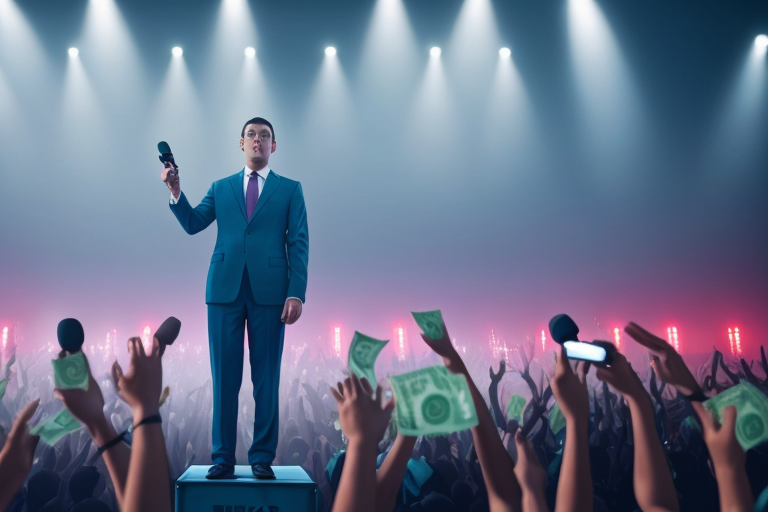The Role of Money in Politics
Money plays a significant role in politics, especially in the United States. It affects every aspect of the democratic process, from campaigning to policymaking. Those with more money have a greater ability to influence the political process, which can lead to a lack of representation for the average citizen. In this article, we will explore the impact of money in politics and the laws and regulations in place to govern campaign finance.
The United States has a long history of money in politics, dating back to the early days of the country. However, the role of money has increased significantly in recent years. The cost of running for office has skyrocketed, making it more difficult for candidates without significant financial backing to compete. This has led to a system where candidates must rely on wealthy donors and special interest groups to fund their campaigns.
The impact of money in politics is far-reaching. It affects not only who runs for office but also the policies they support. Candidates who receive large donations from corporations and special interest groups are more likely to support policies that benefit those donors, even if they are not in the best interest of the general public. This can lead to a lack of representation for the average citizen and a system that favors the wealthy and powerful.
Throughout this article, we will explore the laws and regulations in place to govern campaign finance. We will examine the Federal Election Campaign Act (FECA) and its amendments, as well as the role of the Federal Election Commission (FEC). We will also explore the limits on individual contributions, political parties, and political action committees (PACs). Additionally, we will discuss the impact of PACs, super PACs, and dark money groups on the political process.
By the end of this article, readers will have a better understanding of the role of money in politics and the laws and regulations in place to govern campaign finance. We will also examine efforts to reform the system and the challenges that come with it. Finally, we will analyze the role of money in the 2020 election cycle and its impact on races across the country. It is our hope that this article will encourage readers to remain aware and informed about campaign finance laws and their implications.
Understanding Campaign Finance Laws
Money plays a significant role in politics, and campaign finance laws aim to regulate the flow of money in political campaigns. The Federal Election Campaign Act (FECA) is the primary federal law governing campaign finance in the United States. FECA was enacted in 1971 and has been amended several times to address various issues related to campaign finance.
FECA established the Federal Election Commission (FEC), an independent agency responsible for enforcing campaign finance laws. The FEC has six members, appointed by the President and confirmed by the Senate. The FEC’s primary responsibilities include administering and enforcing campaign finance laws, disclosing campaign finance information, and overseeing public funding of presidential campaigns.
FECA limits the amount of money individuals can contribute to federal candidates, political parties, and political action committees (PACs). For example, in the 2020 election cycle, individuals can contribute up to $2,800 per election to a federal candidate, $35,500 per year to a national political party, and $5,000 per year to a PAC. These limits are periodically adjusted for inflation.
Political parties and PACs are subject to additional regulations, including limits on the amount of money they can spend on behalf of candidates. PACs are classified into two types: connected and non-connected. Connected PACs are affiliated with a particular organization, such as a union or trade association, while non-connected PACs are independent of any organization.
Despite these regulations, some individuals and organizations find creative ways to circumvent campaign finance laws. For example, wealthy donors may contribute large sums of money to super PACs, which can spend unlimited amounts of money on political campaigns as long as they do not coordinate with candidates or political parties. Additionally, dark money groups, which do not disclose their donors, can spend unlimited amounts of money on political campaigns.
The Supreme Court’s 2010 decision in Citizens United v. FEC further complicated the campaign finance landscape. The Court held that corporations and unions have the same free speech rights as individuals and can spend unlimited amounts of money on political campaigns. This decision paved the way for the creation of super PACs and dark money groups.
Efforts to reform the campaign finance system have been ongoing for decades. One proposed solution is public financing of campaigns, which would provide candidates with public funds to run their campaigns instead of relying on private donations. However, public financing proposals face significant challenges, including concerns about the use of taxpayer funds for political campaigns.
In the 2020 election cycle, presidential and congressional candidates used a variety of fundraising strategies to raise money for their campaigns. Small-dollar donations, which are contributions of $200 or less, played a significant role in many campaigns. Outside spending, which includes spending by super PACs and dark money groups, also played a significant role in many races.
The Power of Political Action Committees
Political Action Committees, or PACs, are organizations that raise and spend money to influence elections. There are several types of PACs, including those affiliated with corporations, labor unions, trade associations, and ideological groups. PACs can donate money directly to candidates’ campaigns, but they are also allowed to spend money on independent expenditures, such as advertisements and mailings, as long as they do not coordinate with the candidate or their campaign.
One example of a PAC is the Uvanni PAC, which was founded by a group of business executives to support candidates who favor deregulation and tax cuts. Uvanni PAC has donated millions of dollars to candidates over the years, including Frankie, a politician who has received significant contributions from the PAC. This type of relationship between PACs and politicians raises concerns about the influence of money in politics and the potential for corruption.
To address these concerns, there are regulations in place that limit the amount of money that PACs can donate to candidates and political parties. For example, the Federal Election Campaign Act (FECA) and its amendments established contribution limits for individuals, political parties, and PACs. The FECA also created the Federal Election Commission (FEC), which is responsible for enforcing campaign finance laws and regulating PACs.
However, these regulations have not prevented PACs from finding ways to circumvent campaign finance laws. For example, some PACs have created Super PACs, which can raise and spend unlimited amounts of money on independent expenditures. Super PACs are not allowed to coordinate with candidates or their campaigns, but they can still have a significant impact on elections.
Another way that PACs can influence elections is through dark money groups, which are organizations that do not disclose their donors. Dark money groups can spend unlimited amounts of money on independent expenditures, and they are not required to disclose their spending or donors. This lack of transparency raises concerns about the influence of money in politics and the potential for corruption.
The Supreme Court’s Citizens United decision in 2010 also had a significant impact on campaign finance. The decision allowed corporations and unions to spend unlimited amounts of money on independent expenditures, which further increased the influence of money in politics.
Efforts to reform the campaign finance system have been ongoing for years. One proposal is public financing of campaigns, which would provide government funding for candidates who agree to certain spending limits. However, this proposal has faced challenges, including concerns about the use of taxpayer dollars to fund campaigns.
In the 2020 election cycle, PACs and outside spending played a significant role in both presidential and congressional races. Candidates and their campaigns raised millions of dollars, and outside groups spent even more on independent expenditures. This spending had a significant impact on the outcome of many races.
The Rise of Super PACs and Dark Money Groups
In recent years, the role of super PACs and dark money groups in American politics has become increasingly controversial. Super PACs, also known as independent expenditure-only committees, are political action committees that can raise unlimited amounts of money from individuals, corporations, and unions to support or oppose candidates for federal office. Dark money groups, on the other hand, are nonprofit organizations that can spend unlimited amounts of money on political advertising without disclosing their donors.
The rise of super PACs and dark money groups can be traced back to the 2010 Citizens United v. FEC decision by the Supreme Court. In a 5-4 decision, the Court ruled that corporations and unions have the same free speech rights as individuals, and that they can spend unlimited amounts of money on independent political expenditures. This decision paved the way for the creation of super PACs and dark money groups, which have since become major players in American politics.
Super PACs and dark money groups have had a significant impact on campaign finance in the United States. They allow wealthy individuals and special interest groups to spend unlimited amounts of money on political advertising, often without disclosing their identities. This has led to concerns about the influence of money in politics and the potential for corruption.
One of the most controversial aspects of super PACs and dark money groups is their ability to coordinate with political campaigns. While they are not allowed to coordinate with candidates or political parties, there are often loopholes that allow for indirect coordination. This has led to accusations of illegal coordination and has raised questions about the integrity of the political process.
Despite these concerns, super PACs and dark money groups continue to play a major role in American politics. In the 2020 election cycle, they spent over $2 billion on political advertising, making them one of the largest sources of outside spending. This has led to calls for reform, including proposals for public financing of campaigns and increased disclosure requirements for super PACs and dark money groups.
However, efforts to reform the system have faced significant challenges. Many politicians and interest groups oppose reform, arguing that it would limit free speech rights and stifle political competition. In addition, the Supreme Court has continued to issue rulings that expand the rights of corporations and unions in the political process, making it difficult to enact meaningful reform.
Reforming the Campaign Finance System: Challenges and Proposals
Money has always played a significant role in politics, but the current campaign finance system has allowed wealthy donors and corporations to have an outsized influence on our democracy. The Supreme Court’s Citizens United decision in 2010 further opened the floodgates for unlimited spending by outside groups, leading to a system where money talks louder than the voices of ordinary citizens. However, there have been efforts to reform the system and level the playing field for all candidates.
One proposal for campaign finance reform is public financing of campaigns. This system would provide candidates with public funds to run their campaigns, reducing their reliance on wealthy donors and special interest groups. The goal is to ensure that all candidates have an equal chance of winning, regardless of their financial resources. Public financing has been successful in states like Maine and Arizona, where candidates who participate in the program receive a set amount of funds to run their campaigns. This system has led to more competitive elections and increased participation from small donors.
However, implementing public financing at the federal level has proven to be a challenge. The cost of running a presidential campaign is astronomical, and public financing alone may not be enough to compete with outside spending. Additionally, there is opposition to public financing from those who believe it would be a waste of taxpayer money. Some argue that candidates should be able to raise funds from private donors, as it is a form of free speech protected by the First Amendment.
Despite the challenges, there are politicians who support campaign finance reform. One such politician is Frankie, a congressman who has been a vocal advocate for public financing of campaigns. He believes that the current system is corrupt and that the voices of ordinary citizens are being drowned out by wealthy donors. Frankie has introduced legislation that would establish a public financing system for congressional elections, but the bill has yet to gain traction in Congress.
Another challenge to campaign finance reform is the influence of outside spending. Super PACs and dark money groups can spend unlimited amounts of money on political ads, often without disclosing their donors. This type of spending can sway elections and drown out the voices of ordinary citizens. Efforts to require more transparency in outside spending have been met with resistance from those who believe that donors have a right to privacy.
Ultimately, the issue of money in politics is a complex one, and there is no easy solution. However, it is clear that the current system is not working for the American people. The voices of ordinary citizens are being drowned out by wealthy donors and special interest groups. If we want to ensure that our democracy remains strong, we must take steps to reform the campaign finance system. This includes exploring proposals for public financing of campaigns, increasing transparency in outside spending, and holding our elected officials accountable.
In the end, it is not just about us, but also about the future generation. We must ensure that they inherit a democracy that represents the people and not just the interests of a few. The time to act is now.
The Role of Money in the 2020 Election Cycle
The 2020 election cycle was one of the most expensive in history, with a total of $14.4 billion spent on federal races. The presidential race alone accounted for $6.5 billion of that total, with both candidates raising record-breaking amounts of money.
Joe Biden’s campaign raised a total of $1.5 billion, while Donald Trump’s campaign raised $1.3 billion. In addition to their own fundraising efforts, both candidates received significant support from outside spending groups. Super PACs and other independent expenditure committees spent a total of $3.8 billion on the presidential race, with the majority of that money going towards negative advertising.
One notable fundraising strategy used by both campaigns was the use of virtual events in response to the COVID-19 pandemic. With traditional in-person fundraisers no longer possible, both campaigns turned to virtual events to raise money. Biden’s campaign held a virtual fundraiser with former President Barack Obama that raised $11 million, while Trump’s campaign held a virtual telethon that raised $10 million.
In addition to the presidential race, the 2020 election cycle also saw a record-breaking amount of money spent on congressional races. Democratic candidates raised a total of $7.5 billion, while Republican candidates raised $6.6 billion. Outside spending groups also played a significant role in these races, with a total of $7.2 billion spent on congressional races.
One notable candidate in the 2020 election cycle was Frankie Johnson, a first-time candidate for Congress in a swing district. Johnson’s campaign was largely self-funded, with the candidate contributing over $1 million of his own money to the campaign. Johnson’s opponent, incumbent Representative John Uvanni, received significant support from outside spending groups, including a super PAC that spent over $2 million on negative advertising against Johnson.
The role of money in the 2020 election cycle has once again raised concerns about the influence of wealthy donors and outside spending groups in our political system. While there have been efforts to reform the system, including proposals for public financing of campaigns, these efforts have faced significant challenges. It is up to voters to remain aware and informed about campaign finance laws and their implications, and to hold their elected officials accountable for ensuring a fair and transparent political system.
The Impact of Money in Politics
Money has always played a significant role in politics, but in recent years, the influence of big donors and special interest groups has grown exponentially. The result is a system that often prioritizes the interests of the wealthy and powerful over those of the average citizen.
One of the most significant consequences of the current campaign finance system is the erosion of trust in our democratic institutions. When voters see politicians accepting large sums of money from wealthy donors, they may begin to question whether their elected officials are truly working in their best interests.
Moreover, the influence of money in politics can lead to policies that benefit the wealthy and powerful at the expense of everyone else. For example, corporations and wealthy individuals may be able to use their financial resources to lobby for tax breaks or other policies that benefit them financially, even if those policies are not in the best interests of the broader public.
It’s important to note that the impact of money in politics is not limited to federal elections. State and local races are also affected by the influence of big donors and special interest groups. This means that the decisions made by our elected officials at all levels of government can be influenced by moneyed interests.
So what can be done to address this issue? One important step is to stay informed about campaign finance laws and regulations. By understanding how money influences politics, we can make more informed decisions at the ballot box and hold our elected officials accountable.
Another important step is to support efforts to reform the campaign finance system. This could include proposals for public financing of campaigns or increased transparency around political donations. While these reforms may face significant challenges, it’s important to remember that change is possible when citizens come together to demand it.









